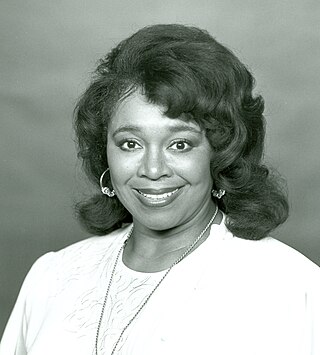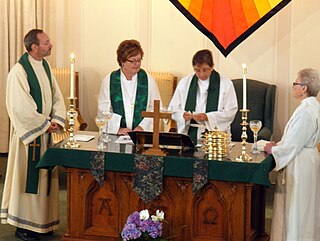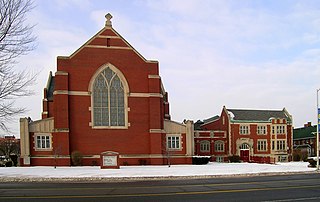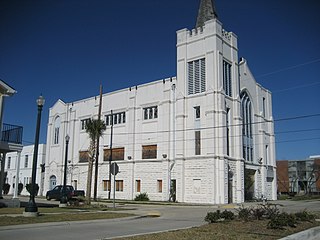Related Research Articles

A tent city is a temporary housing facility made using tents or other temporary structures.

Barbara-Rose Collins was an American politician from the U.S. state of Michigan and the first black woman from Michigan to be elected to Congress.

Nancy L. Wilson is an American cleric who served as the moderator of the Universal Fellowship of Metropolitan Community Churches. Under Wilson's leadership, the denomination became known as "The Human Rights Church" in many parts of the world for its commitment to same-sex marriage, employment and housing non-discrimination laws.

Glide Memorial Church is a nondenominational church in San Francisco, California, formerly a United Methodist Church congregation, which opened in 1930. Since the 1960s, it has served as a counter-culture rallying point, as one of the most prominently liberal churches in the United States. Located in the city's Tenderloin neighborhood, an area affected by drug addiction and homelessness, Glide is known for its social service programs, as well as the Glide Ensemble, its Gospel choir. The church building was listed on the National Register of Historic Places in 2022.

The St. John's Christian Methodist Episcopal Church is a church located in Detroit, Michigan. It was built as the North Woodward Congregational Church, listed on the National Register of Historic Places in 1982, and designated a Michigan State Historic Site in 1998.

Blessed Sacrament Catholic Church is a parish in the Roman Catholic Archdiocese of Los Angeles located on Sunset Boulevard in the heart of Hollywood, California. The church today serves an urban, multiethnic community and is known for, among other things, its gay and lesbian ministry and its many outreach programs, including programs to assist the poor. Founded in 1904, the parish was the home parish for many actors during the classic Hollywood era of the 1920s through the 1950s, including Bing Crosby, John Ford, Irene Dunne, Loretta Young, Ricardo Montalbán and Ann Blyth. The Italian Renaissance church, built in 1928 but not completed until 1954, received a historic preservation grant in 2000 from the J. Paul Getty Trust.

The New Mt. Moriah Baptist Church is located at 13100 Woodward Avenue in Highland Park, Michigan in Metro Detroit. It was built in 1922 as the Trinity United Methodist Church, in the Gothic Revival style. It was listed on the National Register of Historic Places in 1982.

The Central United Methodist Church is located in Downtown Detroit, Michigan. It was designated a Michigan State Historic Site in 1977 and listed on the National Register of Historic Places in 1982.

The Cass Community United Methodist Church is located at 3901 Cass Avenue in Midtown Detroit, Michigan. It was built in 1883 as the Cass Avenue Methodist Episcopal Church, listed on the National Register of Historic Places in 1982, and designated a Michigan State Historic Site in 1985.

The Historic Trinity Lutheran Church is a church located in downtown Detroit, Michigan. It occupies the Trinity Evangelical Lutheran Church complex, located at 1345 Gratiot Avenue. It was designated a Michigan State Historic Site in 1981 and listed on the National Register of Historic Places in 1983. Its current pastor is Rev. Darryl L. Andrzejewski.

Cass Community Social Services, Inc. is a nonprofit, 501(c)(3) community-based organization headquartered in Detroit, Michigan, serving Southeastern Michigan, Wayne County, under the direction of a volunteer Board of Directors. Cass Community Social Services has occasionally engaged In acts of political activism, usually In protest of city and state budget cuts.
Girls' Catholic Central High School (GCC) was a private, non-boarding college preparatory secondary school for girls grades 9 through 12 located in midtown Detroit, Michigan.

New Bethel Baptist Church is a Baptist church located at 8430 C. L. Franklin Boulevard in Detroit, Michigan. It is affiliated with the National Baptist Convention, USA. Founded in 1932, the church was led by C. L. Franklin from 1946 until 1979 and was at the center of the civil rights movement in Detroit. Robert Smith Jr. has been the pastor since 1982. The building was listed on the National Register of Historic Places in 2021.

The Union Bethel A.M.E. Church in New Orleans, Louisiana, at 2321 Thalia St. at the corner of Liberty St., is a historic African Methodist Episcopal church.

The LGBT community in Metro Detroit is centered in Ferndale, Michigan, as of 2007. As of 1997, many LGBT people live in Ferndale, Pleasant Ridge, and Royal Oak. Model D stated in 2007 that there are populations of gays and lesbians in some Detroit neighborhoods such as East English Village, Indian Village, Lafayette Park, and Woodbridge and that the concentration of gay bars in Detroit is "decentralized".

Glenn M. Wagner is an American United Methodist pastor and author. Throughout his 40-year pastoral career, Wagner served congregations in four states and two countries, most notably in Freeport and Harvard, Illinois and North Muskegon, Holt, and Grand Haven, Michigan. Wagner announced his retirement from the United Methodist Church of the Dunes in Grand Haven in October 2016.

Eviction in the United States refers to the pattern of tenant removal by landlords in the United States. In an eviction process, landlords forcibly remove tenants from their place of residence and reclaim the property. Landlords may decide to evict tenants who have failed to pay rent, violated lease terms, or possess an expired lease. Landlords may also choose not to renew a tenant's lease, however, this does not constitute an eviction. In the United States, eviction procedures, landlord rights, and tenant protections vary by state and locality. Historically, the United States has seen changes in domestic eviction rates during periods of major socio-political and economic turmoil—including the Great Depression, the 2008 Recession, and the COVID-19 pandemic. High eviction rates are driven by affordable housing shortages and rising housing costs. Across the United States, low-income and disadvantaged neighborhoods have disproportionately higher eviction rates. Certain demographics—including low income renters, Black and Hispanic renters, women, and people with children—are also at a greater risk of eviction. Additionally, eviction filings remain on renters' public records. This can make it more difficult for renters to access future housing, since most landlords will not rent to a tenant with a history of eviction. Eviction and housing instability are also linked to many negative health and life outcomes, including homelessness, poverty, and poor mental and physical health.

Tiny Homes Detroit is a development of small, one- and two-person tiny homes constructed for low-income tenants by Cass Community Social Services. The development is located on Elmhurst, Monterey and Richton Street, between Woodrow Wilson and the Lodge Freeway in Detroit. The Lodge Freeway is one of the most trafficked freeways in the Motor City.
Moms 4 Housing is a housing activist group in Oakland, California. It was formed and received national attention after three formerly homeless Black women moved their families into a vacant three-bedroom house as squatters without permission from the owner, a real estate redevelopment company. The publicity of their occupation highlighted issues of homelessness, affordable housing, gentrification, and human rights. In January 2020, after resisting a judge's order to leave the residence, "the moms" were forcibly but peaceably arrested and removed by a heavily armed sheriff's department. A few days later, the governor and the mayor brokered a deal with Moms 4 Housing for a local community land trust to purchase what was came to be called the "Moms' House" from the owner. After refurbishing the embattled house, the group began to use it as a transitional home for homeless mothers. The actions of Moms 4 Housing inspired California lawmakers to make changes to housing laws statewide.
The COVID-19 pandemic made homelessness in Toronto more visible, due to the rise of encampments in public parks. However, homelessness in Canada had been an issue of widespread concern long before the pandemic's arrival. A 2016 report found that at least 235,000 Canadians experience homelessness in a year, and 35,000 Canadians experience it on a given night. A Nanos survey found in 2020 that 72% of Canadians believed it was urgent to work toward ending homelessness in Canada. A 2020 report from the Wellesley Institute argues that there were disproportionately higher rates of evictions in Black neighborhoods, and that Black residents were among the worst hit by COVID-19. As part of its stay at home order in March 2020, the Ontario government instated a ban on evictions, however this was lifted with the emergency order in June 2020. The Ontario government however made evictions easier, according to some critics, due to its passage of Bill 184 which allowed landlords to bypass the Landlord and Tenant Board. One advocacy group deemed the cascading effects of Bill 184 'a bloodbath of evictions'. By December 2020, Toronto tenants were calling for a reinstatement of the moratorium on evictions. The crisis conditions of the pandemic lead to an increase in organizing against what many homelessness advocates deemed to be social murder of the city's unhoused. This ranged from legal lawsuits against the city's shelter system to calls for a city plan that would address the large numbers of unhoused people camping outside, to suits against encampment evictions, to large scale protests against the clearings of public parks. The Covid-19 encampments are best understood as emerging out of a longer history of urban informality in Toronto.
References
- 1 2 Green, Leslie (November 13, 2021). "Crain's 2021 100 Most Influential Women". Crain's Detroit Business . Retrieved October 28, 2022.
- ↑ "About". Cass Community Social Services . December 7, 2012. Retrieved April 17, 2023.
- ↑ Fowler, Faith (September 8, 2014). This Far By Faith: Twenty Years At Cass Community. Detroit: Cass Community Publishing House. p. xii. ISBN 978-1939880703.
- ↑ White, Russ; Watts, Hannah (October 15, 2014). "This Far By Faith: Twenty Years at Cass Community Social Services with Faith Fowler". MLive . Retrieved October 28, 2022.
- 1 2 "Rev. Faith Fowler: Making Disciples in Detroit". United Methodist Church . July 29, 2019. Retrieved October 28, 2022.
- ↑ Warikoo, Niraj (August 18, 2016). "The Rev. Faith Fowler of Detroit to receive Shining Light award". Detroit Free Press . Retrieved October 28, 2022.
- 1 2 "1986 Faith Fowler". Boston University . Retrieved October 28, 2022.
- ↑ "Rev. Faith Fowler". Humanity in Action . May 2015. Retrieved October 28, 2022.
- ↑ "Rev. Faith Fowler". Michigan Women Forward . Retrieved January 26, 2024.
- ↑ "Tiny Homes Detroit". Cass Community Social Services . January 30, 2013. Retrieved April 4, 2023.
- ↑ Neavling, Steve. "Activists ready to defend Detroit woman facing eviction from tiny home". Detroit Metro Times . Retrieved April 4, 2023.
- ↑ Dupnack, Jessica (April 4, 2023). "Protesters clash with bailiffs while trying to stop Detroit tiny home eviction". FOX 2 Detroit . Retrieved April 17, 2023.
- ↑ Fenley, Nick (April 4, 2023). "Activists Physically Protect Detroiter With Kidney Disease From Eviction". The Shade Room . Retrieved April 4, 2023.
- ↑ Rahal, Sarah (February 6, 2023). "Detroit's tiny homes promised a path to ownership. It hasn't been fully paved". The Detroit News . Retrieved April 17, 2023.